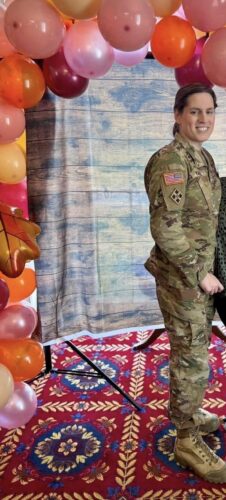Read the other blog posts in our Service Beyond Gender series:
- U.S. Navy Lt. Rae Timberlake’s Mission of Authenticity and Dedication
- As He Prepares to Teach at West Point, Captain Gordon Herrero Reflects on His Leadership Journey
- Major Alivia Stehlik’s Mission of Care and Legacy of Compassion
- Clayton McCallister’s Pursuit of Purpose and Dream of Service
- The Fight to Serve and the Future of the Force
- Nathan Casey’s Journey of Music, Leadership, and Visibility in the Marine Corps
- Major Kara Corcoran’s Leadership Amid Renewed Challenges
- Navy Commander Blake Dremann’s Ultra-Runner Mentality and Relentless Pursuit of Excellence
By guest contributor Trish King
U.S. Army Major Erica Vandal’s story begins long before she ever donned a uniform. As a child, she stood on the sidelines of military family days, watching her father’s artillery units unleash thunderous salvos. The booming echoes, the smell of spent propellant, the precision of the fire missions — it was mesmerizing.
For Vandal, artillery was more than just the branch her father commanded; it was a family legacy. Her father, a Lieutenant General with a storied career in the Army, served at every level of command. He instilled in her the values of discipline, hard work, and leadership, shaping the path she would follow.
When it came time to choose her future, there was never really a question — she would attend West Point and become an artillery officer, just like him. What she didn’t expect? That she would later realize she was transgender, which would put her legacy forged in artillery at risk. But it would also help her live more authentically and build deeper trust as a leader with her soldiers.
Growing Up in the Shadow of Service

Major Erica Vandal
As an Army brat, Vandal lived in nearly two dozen houses across the country and overseas, her life dictated by her father’s assignments. The military was all she had ever known. From a young age, she absorbed the lessons her father lived by: duty first, excellence always, and unwavering commitment to those you lead.
She and her two brothers took these lessons to heart. While her siblings pursued service through the Naval Academy and Marine Corps, Vandal chose West Point, the institution that had shaped her father into the leader she admired most.
It was a place that would mold her, break her down, and build her back up in ways she could never have imagined.
Vandal describes her time at West Point as both grueling and formative. “It truly is a crucible,” she says. “You are never the smartest person in the room, but if you are the hardest working, you will succeed.”
The academy instilled in her an unshakable mental fortitude, the ability to prioritize under immense pressure, and the understanding that leadership meant setting the example, always.
Her father’s influence loomed over her time there. She pushed herself to meet every expectation, excelling in academics, physical training, and leadership roles. Yet, even as she thrived in the structured world of West Point, a part of her remained hidden. She had spent her entire life emulating her father, suppressing the part of herself that didn’t fit the mold.
Finding Her Own Path
Commissioning into Field Artillery, Vandal embraced the branch that had shaped her childhood. She thrived in her roles as a Fire Direction Officer, Platoon Leader, and later, Battery Commander, leading soldiers in combat operations.
Her deployments took her to Afghanistan and, more recently, Romania, where she worked with NATO partners to strengthen allied defenses.
She loved her legacy forged in artillery. She loved the strategy, the power, the coordination required to bring lethal and nonlethal fires into the fight. Yet, even as she rose through the ranks, something was missing. She was living the life she had envisioned — but not as her authentic self.
The Turning Point
Everything changed when her father received a terminal cancer diagnosis. During his final months, they had long, honest conversations. He spoke of regrets — of working tirelessly for a retirement that never came, of lost time with family, of things left unsaid.
For Vandal, those conversations were a wake-up call. “Tomorrow isn’t promised,” she realized. If she continued to live for expectations rather than for herself, she would carry the same regrets. In those final moments with her father, she found the courage to finally be honest — first with herself, and later, with the world.
Coming out as transgender was a transformation, not just personally, but professionally. She had spent years building a reputation as a leader, and she worried how her soldiers and superiors would react. What she found, however, was a deeper connection with those she led.
“By being unabashedly myself, my soldiers knew they could be themselves too,” she says.
Soldiers who had once been reserved began opening up to her — about struggles at home, mental health challenges, fears they had never voiced to other leaders. Her authenticity made her more approachable, her empathy more tangible. It made her a better leader.

She also became a mentor for other transgender service members at Fort Drum, creating a support network and advocating for those navigating their own journeys. For Vandal, leadership was no longer just about accomplishing the mission; it was about ensuring her soldiers felt seen, valued, and supported.
Commitment to Service Amid an Uncertain Future
Despite the shifting political landscape and ongoing debates about transgender service, Vandal remains deeply committed to the Army.
“I have every intention of lacing up my boots and giving my all until I’m told I’m not wanted anymore,” she says.
Her father had loved soldiering. He had been in the Pentagon on 9/11, had led troops through the longest war in American history, and had believed in the mission. Vandal carries that same belief forward, determined to serve for as long as she can.
Away from the battlefield, Vandal has found joy in the small things. She took up crocheting while helping her daughter learn, discovering that the quiet, methodical craft helped her unwind. She spends time with her children, enjoys hiking and snowboarding, and embraces the passions she once set aside.
But artillery remains in her blood. Even now, the sight of a firing battery, the smell of the propellant, the coordinated chaos of a fire mission — it all brings her back to those childhood memories with her father. It is a connection she will never lose.
As Major Vandal looks ahead, she hopes her legacy will be one of leadership through authenticity. Just as her father shaped her, she hopes to leave behind a generation of soldiers who know they are valued, respected, and empowered to be their true selves.
“I’ve learned that people will surprise you,” she says. “If you lead with honesty and care, they will follow.”
About the author: Trish King is a retired U.S. Army infantry NCO and the first openly transgender service member in her field. She writes about military life, family, and LGBTQ+ rights, drawing from her decades of service and personal experience.
Know a veteran who’s struggling? Free help available here.
Sponsored by the SSG Fox Suicide Prevention Program
© Copyright modern military association | EIN 52-1845000 | all rights reserved | legal & Financial
